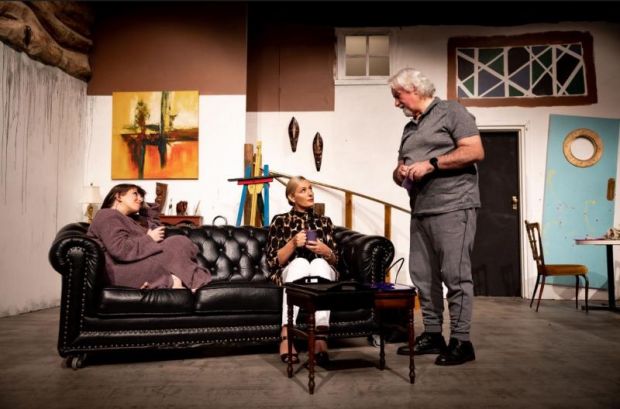Mr Bailey’s Minder
Mr. Bailey’s minder – it’s a job no-one wants. Except Therese – desperately searching for something that will turn her life around, she needs to make it work, despite the odds.
Aging, once-famous painter Leo, now a spiteful, aging, self-destructive alcoholic, needs a full-time carer to remain in his eccentric home, decorated (if that’s the word for it) with his abstractions - yet he has driven away all previous comers, driving his daughter to distraction.
That’s the spark for the intertwined journeys of Debra Oswald’s affecting Australian drama, Mr Bailey’s Minder.
Therese, we eventually discover, has just been released from prison on license (the importance of her success in this job, and her past, are on slow release throughout the play, regularly heightening the dramatic odds). She desperately wants to avoid becoming one of the recidivist prisoners she’s seen and break the criminal patterns of her youth.
Jessica James-Moody takes us on a remarkable personal journey as she brings Therese to life, and sensitively evokes the unlikely, unfolding friendship with her challenging charge, Leo, as she weans him off alcohol and into a more amenable cantankerousness.

On meeting Barry McMaster’s Leo, you wonder that his long-suffering daughter Margo (Donna Randall) still bothers trying to arrange the help he needs to remain in his home. His abusive, belligerent, dismissive tirades leave you un-surprised that she, the last of his children endeavoring to help, is clearly at her wits’ end. McMaster’s Leo is so very brutal, that in Margo’s place most audience members would be long gone. It’s knife-edge.
Donna Randall’s Margo, with her clearly capable corporate demeanor, rouses angry disdain, powerfully unleashed in Barry McMaster’s Leo, and we clearly see and feel the undercurrent of her pain as a subtext, under the tightly constrained composure she mostly retains throughout her performance. Along the way we learn that he’s probably never shown her the affection she craved, and we sense tangible sadness in Randall’s performance.
The only other actor is Brendan Jones, in the contrasting roles of a shyster ripping off the lonely old man, and a tradesman, a genuine bloke clearly attracted to Therese, and able to cope with the idiosyncrasies of the newly sober Leo. Jones nails both characters effectively.
McMaster’s sober Leo still feels like he’s hovering on the edge throughout, but the warm, lively, now more gently combativeness of the banter he shares with James-Moody’s Therese leads to a stretch of this production that is full of warmth and comedy.
James-Moody’s Therese starts out very rough around the edges but by the end of her journey through this play her portrayal reveals a diamond in the rough which has us really rooting for her character to turn her life around. Despite set-backs, we feel hope and affection for her.
All seems to be going well until a birthday party, a photo album and the gift of a bottle of tequila from the shyster unleash the past, triggering Leo’s relapse, and the slap – a shattering climax!
As the play enters its denouement, there’s a sense of hope for Therese. Making a go of her life is still going to be tough, but there’s immense sincerity in the way James-Moody plays a moment suggesting Therese has broken a lifetime pattern, her reaction to Leo’s sketch of her, seeing beauty he’d seen in her which she’d never seen before, and a possibility of love.

Beyond these performances, designer Robert Mason’s depiction of the artist’s house resonates with both the artist’s past creativity and his current, shifting, state of mind.
Director Chad Smith taps into the dynamics of the characters and their interactions perceptively and credibly.
Lighting by Roger and Ruth Hinde accentuates the mood and setting, also highlighting the moment effectively, while Jessica James-Moody’s sound design adds just the right touches.
As she packs up Leo’s life, Donna Randall’s Margo has a powerful bittersweet moment as she silently grasps that Leo’s long-lost portrait of her as a child says far more than his words or actions ever did.
Caring for an aging parent is such a challenging period. Leaving this play I was reminded of just how joyous an experience caring for my own mum was, though sadly that isn’t the universal experience.
Terrific, engaging community theatre, in fact terrific theatre, period.
Neil Litchfield
Subscribe to our E-Newsletter, buy our latest print edition or find a Performing Arts book at Book Nook.

